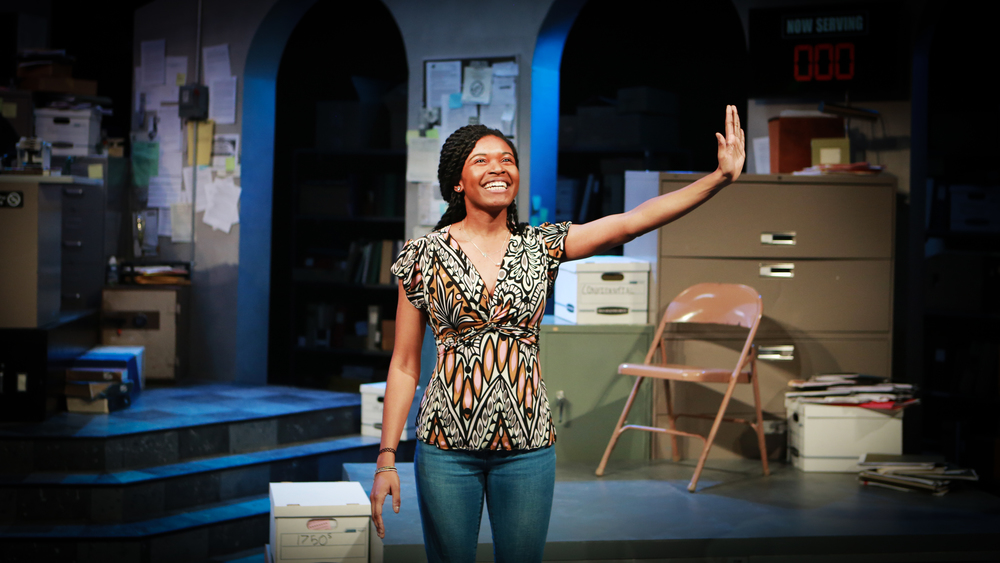
Starr Phillips ’19 (Gloria) in The Last Days of Judas Iscariot. Photo: Sue Kessler
In Judas: Morality, Mortality, and the DMV.
By: Rachel Karp ’18
The sound of rain. Filing cabinets. An assortment of cardboard boxes labeled “confidential,” neatly numbered with dates from the past century. Here is a divine courtroom reminiscent of your local DMV. But despite its apparent familiarity, we have been transported to a little corner of purgatory called Hope, where Judas Iscariot is being put on trial for his betrayal of Jesus Christ. It is the world of Stephen Adly Guirgis’s The Last Days of Judas Iscariot, as directed by seniors Hannah Baker and Theo Saroglou.
Guirgis’s play introduces a larger-than-life cast of characters: Fabiana Aziza Cunningham (Julia Friedland ’18), Judas’s unwaveringly determined defense attorney; Judge Littlefield (Keegan Kelly ’17), the often-frustrated, conservative judge; and El Fayoumy (Ethan Embry ’19), the passionate and flirtatious prosecutor. All three immediately come head-to-head over Judas’s case.
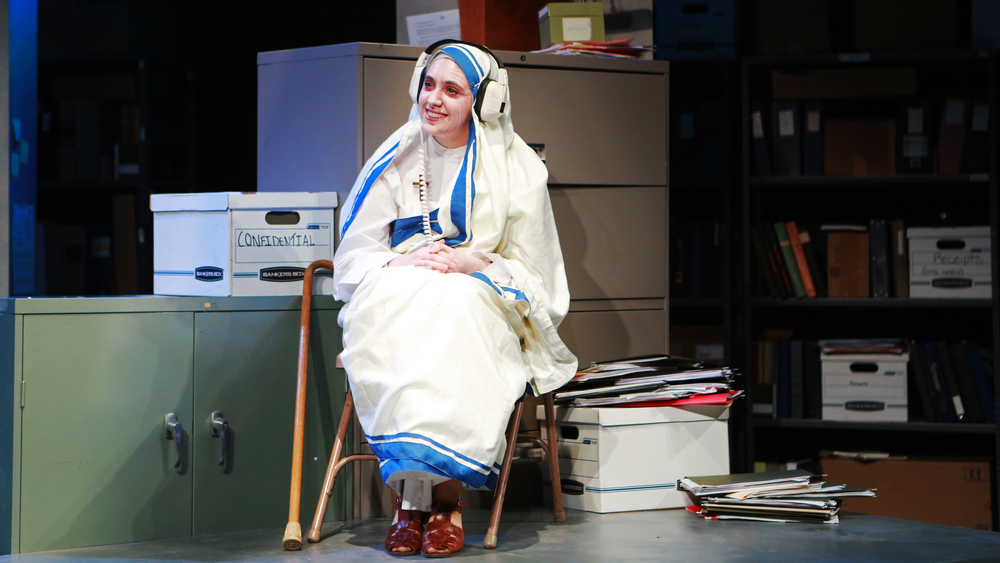
Olivia Bagg ’19 (Mother Teresa). Photo: Sue Kessler
Before long, the trial is underway. We hear lively testimony, brimming with humor, from an eclectic cast of historical figures. Pontius Pilate (Brandon Bogle ’16), who essentially owned the streets of the Roman province of Judea, dresses and acts as though he now owns the streets of Compton, too. Historically known for his role in the crucifixion of Jesus, his testimony reveals not only who he was in ancient Rome, but also who he would be today.
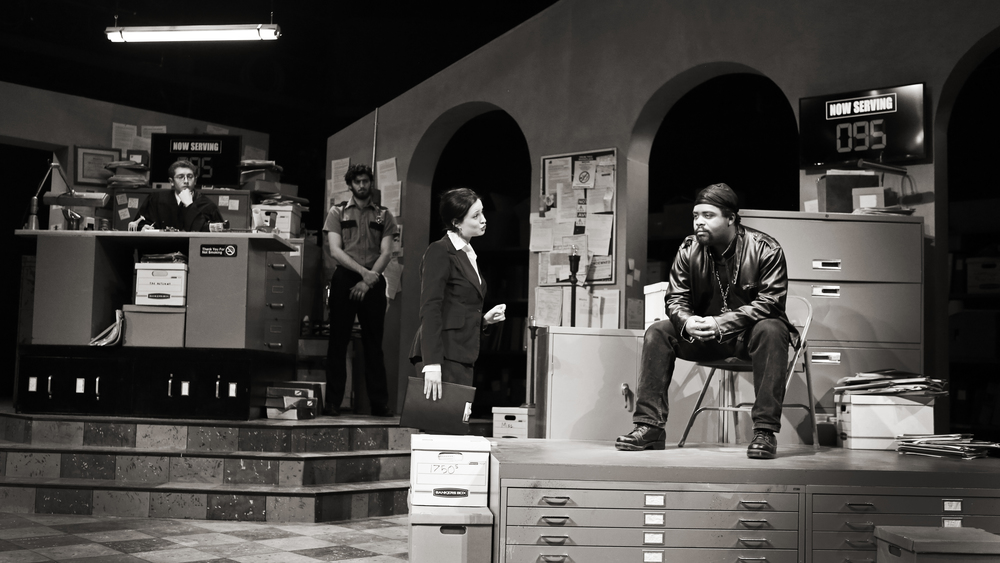
Julia Friedland ’18 (Fabiana Aziza Cunningham) and Brandon Bogle ’16 (Pontius Pilate). Photo: Sue Kessler
The same can be said for Simon the Zealot (Dave Schechter ’18). One of Jesus’s original twelve apostles, Simon the Zealot was a strict follower of Jewish law. Accordingly, Schechter takes the stand dressed in traditional, orthodox Jewish garb. When he speaks, though, he does so with an unmistakably modern surfer-frat-boy drawl.
These simultaneous feelings of antiquity and modernism, reflected in Alyssa Opishinksi’s costume design, lend the play a sense of timelessness. For instance, in a scene where young Judas (Chris Naughton ’17) invites Matthias of Galilee (Jadon Sokoll-Ward ’19) to play spinning top, Judas is dressed in tattered, yellowing pants and a similarly ancient-looking shirt. In stark contrast, Matthias of Galilee wears a baseball cap and modern t-shirt. The effect is a scene that possesses the unique quality of memory, blending the past with the present.
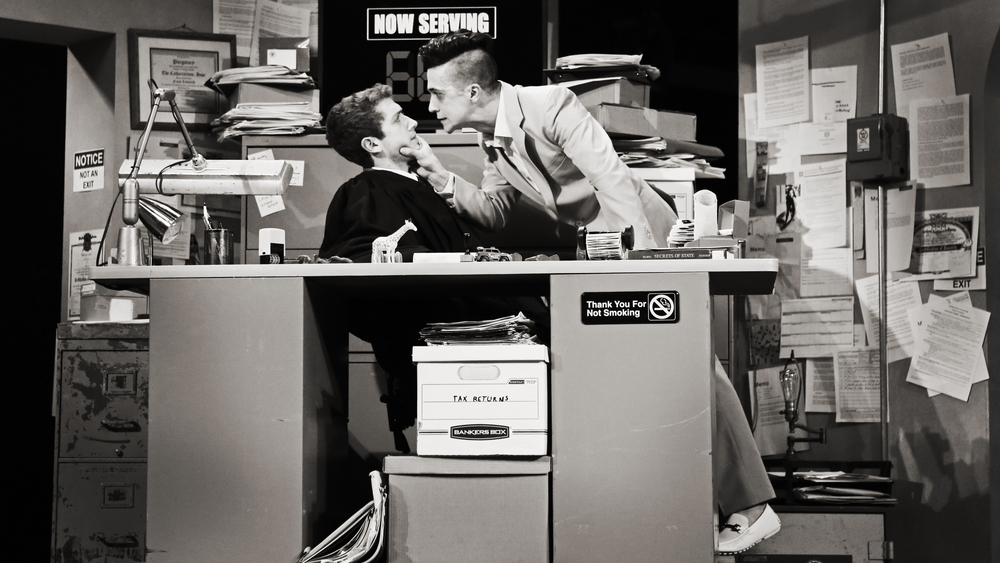
Keegan Kelly ’17 (Judge) and Shea Leavis ’17 (Satan). Photo: Sue Kessler
Jared Klein’s lighting choices, too, help to construct this mixture of past and present, of common and divine. Instances in which we see the full extent of Judas’s quiet despair are highlighted by a warm, dim light that drops down from the ceiling, casting dark shadows across Judas’s face. Standing lamps blend in with the normality of the courtroom during much of the play, but are lit in place of the fluorescents when the courtroom empties and the saints, Mary Magdalene (Sarabell Wrigley ’16) and Saint Monica (Olivia Irby ’18), are left alone to speak.
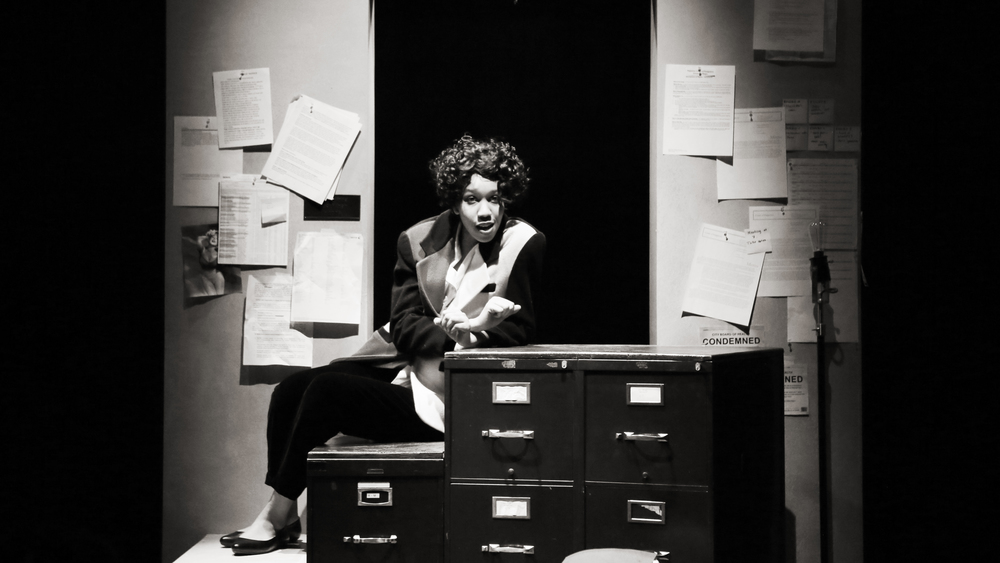
Olivia Irby ’18 (Saint Monica). Photo: Sue Kessler
There were plenty of moments that had the audience in tears of laughter, such as every time juror Loretta (Rigel Harris ’16), an old lady in a hospital gown, complete with open back and granny panties, walked across the stage. Yet, The Last Days of Judas Iscariot is not afraid to ask the big questions either, usually when the audience least expects it. When Satan (Shea Leavis ’17) takes the stand for a second time, he quickly flips Cunningham’s questions around, bringing up pieces of Cunningham’s, Littlefield’s and El Fayoumy’s pasts before finally addressing the questions that everyone else had been too afraid to ask: What does it mean to be guilty? Is anyone truly innocent? How do we come to terms with our own mortality and our own guilt?
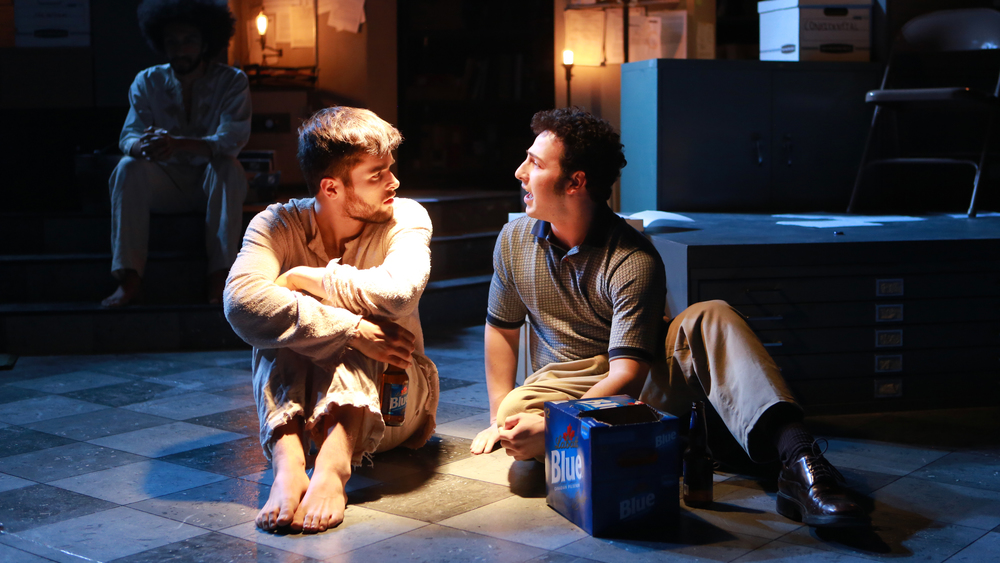
Chris Naughton ’17 (Judas) and Ben Rainey ’16 (Butch Honeywell). Photo: Sue Kessler
Grappling with these questions himself, juror Butch Honeywell (Ben Rainey ’16) goes to see Judas, who by the end of the play has been found guilty. Honeywell is the embodiment of the common man. In him, we see our friends, our family, our neighbors, and ourselves. He reveals his own guilt, how he made mistakes, and how he loved. His scene, which closes the show, is tinged with painful familiarity, and, as the audience sits in purgatory along with the actors, both sides’ anguish is softly underscored by the sound of rain—all while Butch sits with Judas, beer in hand, slowly coming to terms with his own death.
***
Rachel Karp is a sophomore Theater/English double-major and Associate Editor of the Living Newsletter.
Production Photos
Reflections from the Cast
Olivia Irby ’18 (Saint Monica): The other day I was talking with my friends about the show and its portrayal of stereotypes. That was something I struggled with a lot throughout rehearsals. I was given the opportunity to play this amazing, strong willed character, but because of my identity as a Black woman I was afraid of falling into the overdone stereotype of a sassy Black woman. As an actor and socially conscious human I wanted to strive for more. At a certain point I began to overthink it and I had to realize that this role could not transcend my race. I am who I am. And Monica is who she is and as an actor. I had to work with that and do my best to do her justice. I appreciate that Monica has her serious and tender moments with Judas, yet she is always unabashedly herself regardless of what others may say about her. That is something I strive for every day.
Brandon Bogle ’16 (Pontius Pilate): A lot of characters in the play, and my role in particular, come off as stereotypes at first. Pontius Pilate is clearly a bit of a thug after all, but as the scenes go on we find a deeper level to him. I think that extends to most characters in this show. We as an audience and people who know about the bible have a lot of specific notions about who these characters are and what we expect from them. But at the end of the day we never really knew them and this show keeps asking us how much we understand. Furthermore, I’m deeply attached to the idea of forgiveness in this play. The characters condemned to hell or to other terrible fates are people who are incapable of accepting and forgiving themselves for the bad things they did in life. We’re all people who have done good and bad and if we can let go and strive to be better, then maybe we’ll get to our own little heavens. Otherwise we trap ourselves in our personal hells.
Shea Leavis ’17 (Satan): My favorite aspect of the show is that it encourages people to reflect on how harshly we all judge ourselves, and to accept our flaws as vital parts of our personalities. When it comes to character choices everything fell into place one day when Hannah told me I was a large baby throwing a temper tantrum. I admire Satan a lot, because he has a dedication to the truth, and understands that a lot of the time the truth is more valuable than just saying what is nice to hear.
Production Credits
Written by Stephen Adly Guirgis
Directors: Hannah Baker ’16 and Theo Saroglou ’16
Scenic Design: Mackenzie Whiting ’16
Lighting Design: Jared Klein
Costume Design: Alyssa Opishinski
Sound Design: Max Helburn ’18
Hair & Make-Up Design: Alyssa Hagerbrant ’16
Stage Manager: Omi Furst ’18
Cast: Olivia Bagg ’19 (Mother Teresa), Matthew Beckstrom ’16 (Sigmund Freud), Brandon Bogle ’16 (Pontius Pilate), Ethan Embry ’19 (El Fayoumy), Julia Friendland ’18 (Fabiana Aziza Cunningham), Rigel Harris ’16 (Loretta/Sister Glenna), Olivia Irby ’18 (Saint Monica), Jake Janengiser ’18 (Saint Thomas), Keegan Kelly ’17 (Judge/Caiaphas the Elder), Grand Landau-Williams ’19 (Jesus), Shea Leavis ’17 (Satan), Chris Naughton ’17 (Judas Iscariot), Starr Philips ’19 (Gloria), Ben Rainey ’16 (Butch Honeywell), Izabella RInskaya ’19 (Henrietta Iscariot), Dave Schechter ’18 (Bailiff/Simon the Zealot), Jadon Sokoll-Ward ’19 (Matthias), Sarabell Wrigley ’16 (Mary Magdalene).
Production Team: Chloe Brush ’18 (Assistant Lighting Designer), Ariella Hakim ’17 (Assistant Stage Manager), Julia Kelliher ’18 (Assistant Costume Designer), Julianna Quiroz ’17 (Assistant Costume Designer), Ashley Saiwa ’17 (Assistant Costume Designer).
Related Articles
Invisible Art: Designing “The Last Days of Judas Iscariot”
6 Questions for “Judas” Actor Chris Naughton ’17
Video Interview w/Directors Hannah Baker ’16 and Theo Saroglou ’16






















